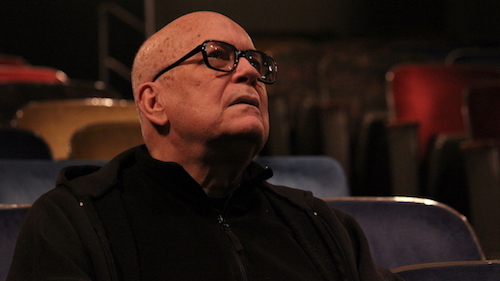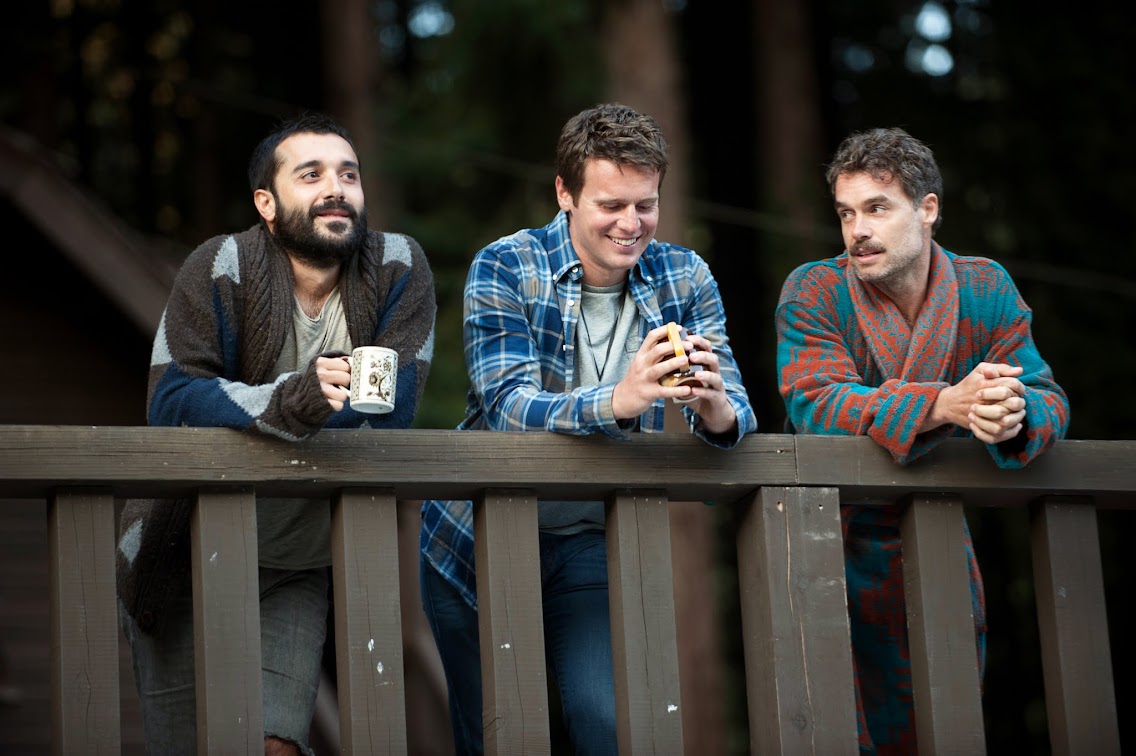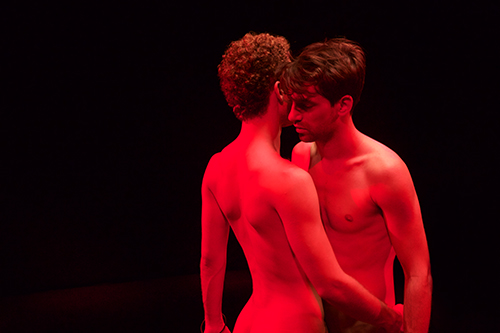Monday, June 6, 2016
The 40th San Francisco International LGBTQ Film Festival (Frameline40)
The 40th edition of the annual San Francisco LGBTQ film festival, Frameline40 takes place June 16-26, 2016 in San Francisco, Berkeley, and Oakland. It showcases 155 films, including 72 features, from 24 countries with two foci: "Social Justice & Identity" and "Fresh Perspectives on Youth & Teens."
Here are some highlights of this year's festival:
- Opening
and Closing
Night
The recipient of this year's Teddy Award for best documentary, "Kiki" (USA 2016 | 94 min. | Documentary) opens the festival on Thursday, June 16. It tells the story about a group of LGBT youth of color who makes a splash in the ballroom dancing scene in New York City.
Picking up from the end of season 2 of the HBO series "Looking" (USA 2014-2015) about three gay friends living in San Francisco, the writer-director Andrew Haigh's new film "Looking: The Movie" (USA 2016 | 85 min.) closes the festival on Sunday, June 26, and perhaps once for all, closes the TV series.
- Centerpiece
There are three centerpiece presentations in the middle of the festival.
The director Deb Shoval's "AWOL" (USA 2016 | 85 min.) unfolds a love story when a young high school tomboy meets a married mom.
The veteran French director André Téchiné, who made "Wild Reeds" (Les roseaux sauvages | France 1994) more than two decades ago, returns to the festival with his new film "Being 17" (Quand on a 17 ans | France 2016 | in French | 116 min.) which captivatingly captures the complex desire between two adolescent classmates.
The director Deborah Esquenazi's "Southwest of Salem: The Story of the San Antonio Four" (USA 2016 | 91 min. | Documentary) follows the effort by the Innocence Project that tries to clear the names of four Latina lesbian women in San Antonio, Texas, who were convicted a sex crime in 1994.
- The
Frameline Award

 For 30 years, the Frameline Award is given annually to
recognize major contributions to LGBTQ representation in
film, television, or the media arts. This year's
Frameline Award recipient is Robert
Hawk. Following the award presentation, there is a
screening of "Film
Hawk" (USA 2016 | 75 min. | Documentary) directed by
JJ Garvine
and Tai Parquet
that highlights Hawk's contribution.
For 30 years, the Frameline Award is given annually to
recognize major contributions to LGBTQ representation in
film, television, or the media arts. This year's
Frameline Award recipient is Robert
Hawk. Following the award presentation, there is a
screening of "Film
Hawk" (USA 2016 | 75 min. | Documentary) directed by
JJ Garvine
and Tai Parquet
that highlights Hawk's contribution.
- Showcase
Presentation
Ten films are presented as showcase films including Andrew Ahn's superb feature directorial debut "Spa Night" (USA 2016 | in Korean | 93 min.) and a nostalgic "Strike a Pose" (Netherlands 2016 | 83 min. | Documentary) about the dancers in Madonna's Blond Ambition World Tour in the '90s.
- US
Narrative Features
The festival presents additional 15 additional US feature narratives that are not in the previous sections.
- World
Cinema
In addition to foreign films presented in the previous sections, the festival picks another 15 foreign narrative features that "engage, challenge, and entertain on a global scale."
- Documentaries
The festival presents 25 additional documentaries around the globe that tells LGBTQ stories.
- Shorts
Frameline would not be complete without its strong and extensive shorts program year after year. Besides the traditional crowd pleasing comedies in "Fun in Boys Shorts" and "Fun in Girls Shorts," and the artistic "Worldly Affairs" in foreign languages, the festival continues its " Only in San Francisco" program to enhance the local flavor.
Frameline40 runs June 16-26, 2016 at Castro Theater, Roxie Theater, and Victoria Theater in San Francisco, Rialto Cinemas Elmwood in Berkeley, and Landmark's Piedmont Theatre in Oakland.
The following are my reviews (or capsule review if a title is under hold review status) of a few feature films at the festival. As always, each film's title is linked to the festival program which has the showtime and venue information. Each film's still image is linked to a film's official Web site if it's available. In random order:
- Spa Night (USA 2016 | in Korean | 93 min.)
- Front Cover (USA 2015 | 87 min.)
- Strike a Pose (Netherlands/Belgium 2016 | 83 min. | Documentary)
- Inside the Chinese Closet (Netherlands/China 2015 | in Mandarin | 72 min. | Documentary)
-
Spa Night (USA 2016 | in Korean | 93 min.)
One film that you should not miss at this year's festival is the writer-director Andrew Ahn's superb feature directorial debut "Spa Night." Set in the Los Angeles area, the film tells an engaging story about an introvert Korean American teenager David (Joe Seo). David struggles with his sexuality while fulfilling his obligation to help out his parents by working at a Korean style public bath house. With a deep understanding of Korean culture in the immigration community, Andrew Ahn terrifically creates several arresting characters, and Joe Seo gave a mesmerizing performance as the sensitive David.
-
Front Cover (USA 2015 | 87 min.)
The New York Times recently published an article about the fight for visibility for Asian-American actors. It seems writer-director Ray Yeung understands the issue well. In the dialogue of his sophomore feature "Front Cover," he jabs at the stereotype treatments several times. Yet, it's disappointing to see him falling into the same formulaic trap and creating stereotypical characters in an unconvincing plot.
While Jake Choi did a great job as Ryan, a New York City stylist for a fashion magazine, James Chen appeared awkward when he was directed to speak in a fake accent playing Ning, a closeted actor in China. Despite the two characters having no chemistry and getting on each others' nerves when they first met, they become romantically involved like in a fairy tale while delivering some corny lines.
-
Strike a Pose (Netherlands/Belgium 2016 | 83 min. | Documentary)
It has been 25 years since the provocative documentary "Madonna: Truth or Dare" (1991) chronicled Madonna's Blond Ambition World Tour and revealed the intimate relationship between Madonna and her seven stage dancers. How are those dancers now? The new documentary "Strike a Pose," directed by Ester Gould and Reijer Zwaan, revisits these dancers who have matured not only physically, but more so mentally.
Combing footage and candid on-camera interviews, these dancers reflect back to the experience during the tour, the growth after the tour, the struggle with their own secrets, and the grief and survival over the AIDS crisis. Although the reunion appears to contain more pretentious acting for the camera than sincere catching up with each other, the nostalgic sentiment cannot be more genuine.
- Inside
the Chinese Closet (Netherlands/China
2015 | in Mandarin | 72 min. | Documentary)
"I am very popular," winking at the camera, Andy claims confidently with a beer bottle in hand. A young gay architect in Shanghai, stocky Andy is one of the two main subjects in Dutch director Sophia Luvara's intriguing documentary "Inside the Chinese Closet." Her other subject is a tomboy lesbian Cherry who is equally outgoing and self-assured.
Although it has come a long way in today's China since Ruby Yang's portrait about gay youth in "Tongzi in Love" (彼岸浮生 2008), gays and lesbians in China continue to face the stigma that is uniquely in Chinese culture influenced by the teaching of Confucius (儒家)—"Among the three major offenses against filial piety, not producing an heir is the worst." (不孝有三无后为大.)
Despite young people like Andy and Cherry who have come out of the closet to their parents, their parents' generation cannot always embrace the reality, and some parents end up going into the closet themselves. They coax their gay children to enter into sham marriages so that they can have grandchildren and save face in front of relatives and friends.
While Andy seems popular and has no problem finding guys, it's not easy for him to find a lesbian to marry. Under the coaching of his father, he "interviews" lesbian candidates for the possibility of forging a marriage. Meanwhile, Cherry is already married to a gay guy, but she is desperately trying to find a way to give her parents a grandchild, including through adoption. This film intimately follows each subject's persistent quest and provides us a rare snapshot of gay lives and their struggle in China today.
It might have gotten better, but the light at the end of the tunnel is yet to be seen, especially in China.


















